名词性从句在高考写作中的应用
- 格式:ppt
- 大小:1.10 MB
- 文档页数:21
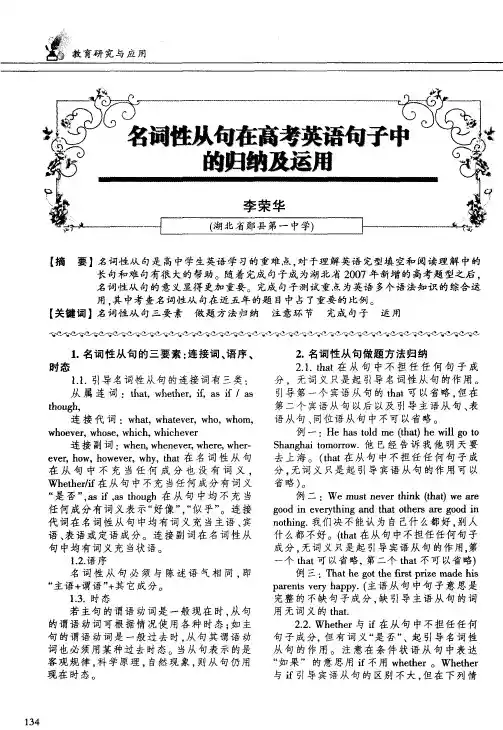
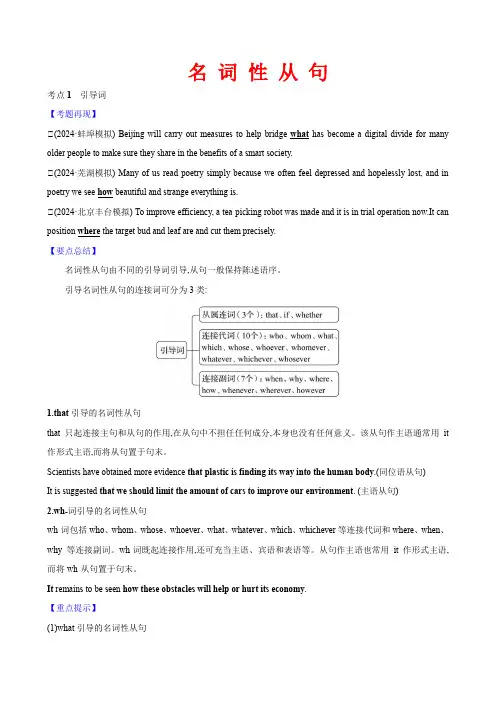
名词性从句考点1引导词【考题再现】①(2024·蚌埠模拟) Beijing will carry out measures to help bridge what has become a digital divide for many older people to make sure they share in the benefits of a smart society.①(2024·芜湖模拟) Many of us read poetry simply because we often feel depressed and hopelessly lost, and in poetry we see how beautiful and strange everything is.①(2024·北京丰台模拟) To improve efficiency, a tea-picking robot was made and it is in trial operation now.It can position where the target bud and leaf are and cut them precisely.【要点总结】名词性从句由不同的引导词引导,从句一般保持陈述语序。
引导名词性从句的连接词可分为3类:1.that引导的名词性从句that只起连接主句和从句的作用,在从句中不担任任何成分,本身也没有任何意义。
该从句作主语通常用it 作形式主语,而将从句置于句末。
Scientists have obtained more evidence that plastic is finding its way into the human body.(同位语从句)It is suggested that we should limit the amount of cars to improve our environment. (主语从句)2.wh-词引导的名词性从句wh-词包括who、whom、whose、whoever、what、whatever、which、whichever等连接代词和where、when、why等连接副词。
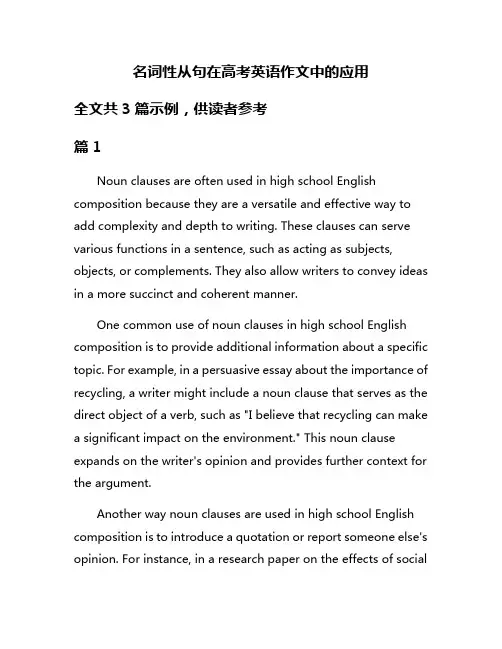
名词性从句在高考英语作文中的应用全文共3篇示例,供读者参考篇1Noun clauses are often used in high school English composition because they are a versatile and effective way to add complexity and depth to writing. These clauses can serve various functions in a sentence, such as acting as subjects, objects, or complements. They also allow writers to convey ideas in a more succinct and coherent manner.One common use of noun clauses in high school English composition is to provide additional information about a specific topic. For example, in a persuasive essay about the importance of recycling, a writer might include a noun clause that serves as the direct object of a verb, such as "I believe that recycling can make a significant impact on the environment." This noun clause expands on the writer's opinion and provides further context for the argument.Another way noun clauses are used in high school English composition is to introduce a quotation or report someone else's opinion. For instance, in a research paper on the effects of socialmedia on teenagers, a writer might include a noun clause that acts as the subject of a sentence, such as "Studies have shown that excessive use of social media can lead to decreased academic performance." This allows the writer to present a factual statement without inserting their own opinion.Noun clauses can also be used to create complex sentences that showcase a writer's ability to manipulate language effectively. By incorporating subordinate clauses into their writing, students can demonstrate their proficiency in grammar and syntax while adding sophistication to their arguments. For example, in a literary analysis essay on Shakespeare's "Hamlet," a student might include a noun clause that serves as the object of a preposition, such as "The protagonist's inner turmoil is evident in his soliloquies, where he questions whether 'to be or not to be.'"In conclusion, noun clauses are a valuable tool for high school students in English composition. By understanding how to use these clauses effectively, students can enhance the clarity and complexity of their writing. Whether providing additional information, introducing quotations, or creating complex sentences, noun clauses are a versatile resource that can help students succeed in their academic endeavors.篇2The Application of Noun Clauses in English Writing in the College Entrance ExaminationIn the English writing section of the college entrance examination, one essential grammatical structure that students need to master is noun clauses. Noun clauses, also known as nominal clauses, function as a noun within a sentence and can serve a variety of purposes, such as subject, object, complement, or appositive. Understanding how to use noun clauses correctly can greatly enhance the clarity and cohesion of one's writing. In this article, we will explore the application of noun clauses in high school English essays and provide examples of how they can be effectively integrated into writing.One common way in which noun clauses are used in essays is as a subject of a sentence. For example, in a persuasive essay on the importance of environmental conservation, a student might write: "What we do now will have a significant impact on the future of our planet." In this sentence, the noun clause "What we do now" functions as the subject of the sentence, emphasizing the importance of taking action to protect the environment.Noun clauses can also be used as the object of a verb, such as in the sentence: "I believe that education is the key to a better future." Here, the noun clause "that education is the key to a better future" serves as the direct object of the verb "believe," expressing the speaker's belief about the importance of education.Moreover, noun clauses can function as complements in a sentence, providing additional information about the subject or object. For instance, in a discussion of the factors that contribute to success, a student might write: "The idea that hard work leads to success is a common belief." In this sentence, the noun clause "that hard work leads to success" serves as the complement of the subject "idea," elucidating the common belief about the relationship between hard work and success.In addition to serving as subjects, objects, and complements, noun clauses can also be used as appositives, providing further explanation or clarification. For example, in a description of a memorable experience, a student might write: "My dream of becoming a doctor, which had been nurtured since childhood, finally came true." Here, the noun clause "which had been nurtured since childhood" serves as an appositive to the noun"dream," providing additional information about the persistence of the student's goal.In conclusion, noun clauses play a crucial role in enhancing the coherence and precision of writing in the college entrance examination. By mastering the use of noun clauses as subjects, objects, complements, and appositives, students can effectively convey their ideas and arguments in a clear and organized manner. Therefore, it is essential for students to familiarize themselves with the various functions of noun clauses and practice incorporating them into their essays. With diligent study and practice, students can confidently apply noun clauses in their writing and achieve success in the English writing section of the college entrance examination.篇3The Application of Noun Clauses in the English Composition of the College Entrance ExaminationIntroductionIn the English composition of the college entrance examination, noun clauses play a significant role in enhancing the complexity and coherence of the writing. Noun clauses are subordinate clauses that act as nouns in a sentence, and they canfunction as subjects, objects, complements, or possessives. By using noun clauses effectively, students can demonstrate their proficiency in grammar, vocabulary, and sentence structure, thus earning higher scores in the examination. This article will explore the application of noun clauses in the English composition of the college entrance examination and provide examples to demonstrate their effective use.1. Noun Clauses as SubjectsOne of the common uses of noun clauses in English composition is as subjects in a sentence. Noun clauses that function as subjects typically begin with words such as "that," "who," "what," "where," or "how." For example, in the sentence "What she said surprised everyone," the noun clause "What she said" functions as the subject of the sentence. By using noun clauses as subjects, students can vary their sentence structures and create more engaging and sophisticated compositions.2. Noun Clauses as ObjectsNoun clauses can also be used as objects in a sentence, either as direct objects, indirect objects, or objects of prepositions. Noun clauses that function as objects typically begin with words such as "that," "if," "whether," or "why." For example, in the sentence "I wonder whether he will come to theparty," the noun clause "whether he will come to the party" functions as the object of the verb "wonder." By using noun clauses as objects, students can convey their thoughts and opinions more effectively in their compositions.3. Noun Clauses as ComplementsNoun clauses can also be used as complements in a sentence, either as subject complements or object complements. Noun clauses that function as subject complements typically begin with words such as "that," "what," or "who." For example, in the sentence "His only wish is that she accepts his apology," the noun clause "that she accepts his apology" functions as the subject complement of the verb "is." By using noun clauses as complements, students can provide additional information and clarification in their compositions.4. Noun Clauses as PossessivesNoun clauses can also be used as possessives in a sentence, indicating ownership or relationship. Noun clauses that function as possessives typically begin with words such as "whose," "where," or "of which." For example, in the sentence "The book whose cover is torn belongs to me," the noun clause "whose cover is torn" functions as the possessive of the noun "book." By using noun clauses as possessives, students can show theirunderstanding of relationships and connections in their compositions.ConclusionIn conclusion, noun clauses are valuable tools for students to enhance the complexity and coherence of their English compositions in the college entrance examination. By using noun clauses as subjects, objects, complements, or possessives, students can demonstrate their proficiency in grammar, vocabulary, and sentence structure. Through effective application of noun clauses, students can create more engaging and sophisticated compositions, thus increasing their chances of earning higher scores in the examination. It is essential for students to practice using noun clauses in their writing to improve their overall English proficiency and succeed in the college entrance examination.。
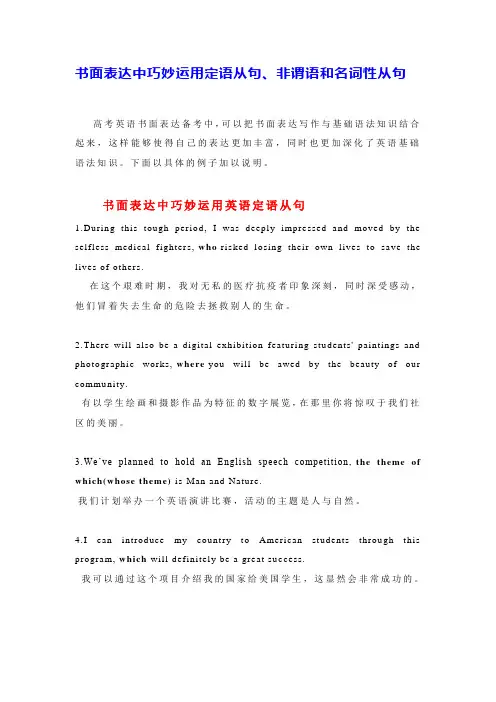
书面表达中巧妙运用定语从句、非谓语和名词性从句高考英语书面表达备考中,可以把书面表达写作与基础语法知识结合起来,这样能够使得自己的表达更加丰富,同时也更加深化了英语基础语法知识。
下面以具体的例子加以说明。
书面表达中巧妙运用英语定语从句1.During this tough period, I was deeply impressed and moved by the selfless medical fighters,who risked losing their own lives to save the lives of others.在这个艰难时期,我对无私的医疗抗疫者印象深刻,同时深受感动,他们冒着失去生命的危险去拯救别人的生命。
2.There will also be a digital exhibition featuring students' paintings and photographic works,where you will be awed by the beauty of our community.有以学生绘画和摄影作品为特征的数字展览,在那里你将惊叹于我们社区的美丽。
3.We’ve planned to hold an English speech competition,the theme of which(whose theme) is Man and Nature.我们计划举办一个英语演讲比赛,活动的主题是人与自然。
4.I can introduce my country to American students through this program, which will definitely be a great suc cess.我可以通过这个项目介绍我的国家给美国学生,这显然会非常成功的。
5.In the past three years I have taken part in many social activities in which I performed well and gained rich experience.在过去的三年时间内,我参加了很多社会活动,在这里我表现很好,同时获得了丰富的经验。
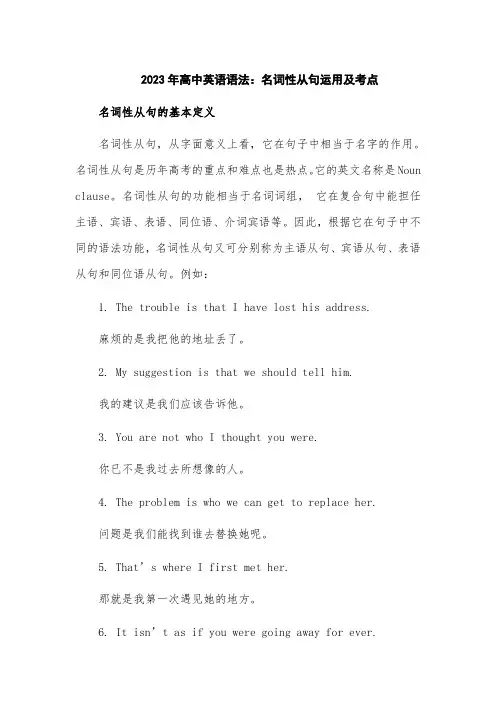
2023年高中英语语法:名词性从句运用及考点名词性从句的基本定义名词性从句,从字面意义上看,它在句子中相当于名字的作用。
名词性从句是历年高考的重点和难点也是热点。
它的英文名称是Noun clause。
名词性从句的功能相当于名词词组,它在复合句中能担任主语、宾语、表语、同位语、介词宾语等。
因此,根据它在句子中不同的语法功能,名词性从句又可分别称为主语从句、宾语从句、表语从句和同位语从句。
例如:1. The trouble is that I have lost his address.麻烦的是我把他的地址丢了。
2. My suggestion is that we should tell him.我的建议是我们应该告诉他。
3. You are not who I thought you were.你已不是我过去所想像的人。
4. The problem is who we can get to replace her.问题是我们能找到谁去替换她呢。
5. That’s where I first met her.那就是我第一次遇见她的地方。
6. It isn’t as if you were going away for ever.又不是你离开不回来了。
7. Now it was as though she had known Millie for years.现在好像她认识米莉已有好多年了似的。
8. It is not as though we were poor.又不是我们家里穷。
9. That he is still alive is a wonder.他还活着,真是奇迹。
10. That we shall be late is certain.我们要晚了,这是确定无疑的。
名词性从句分类根据从句在主句中所做的成分,名词性从句可以分为以下4种:例如:(1)That the seas are being over fished has been known for years.海洋正在被人们过渡捕捞,许多年来这已是尽人皆知的事情了。




灵活好用的名词性从句名词性从句是高中阶段重要的语法项目之一,也是写作中常用的高级表达。
它包括主语从句、宾语从句、表语从句和同位语从句。
一、名词性从句的连接词1.从属连词引导的名词性从句名词性从句的从属连词在从句中只起连接作用,不作成分,主要包括that, whether/if。
①The last important thing you should remember is that you have to send the article to me before June 28th.(2015·全国卷Ⅰ满分作文)你应该记住的最后一件重要事情是在6月28日前把文章发给我。
②What really matters is whether it comes from your inner heart.(2014·重庆高考写作)真正重要的是它(礼物)是否来自你的内心。
2.连接代词引导的名词性从句名词性从句的连接代词在从句中起连接作用,并在从句中充当主语、表语、宾语、定语,主要包括what, which, who, whom, whose, whatever, whoever, whomever, whichever。
①Today is what we can hold and make use of.(2015·重庆高考满分作文)今天是我们能够抓住并能利用的。
②I’ll do a good job in whatever I do.(2014·全国卷Ⅱ书面表达)对于我所做的任何事情,我都会做好。
③Whoever is interested in making small inventions can join in it. (2014·辽宁高考满分作文)对小发明感兴趣的任何人都可以参加。
3.连接副词引导的名词性从句名词性从句的连接副词在从句中起连接作用,并在从句中充当状语,主要包括how, when, why, where, however, whenever, wherever。
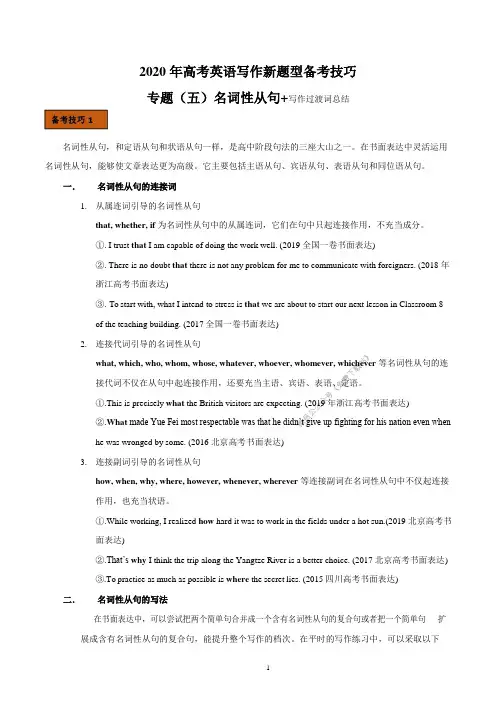
2020 年高考英语写作新题型备考技巧专题(五)名词性从句+写作过渡词总结名词性从句,和定语从句和状语从句一样,是高中阶段句法的三座大山之一。
在书面表达中灵活运用名词性从句,能够使文章表达更为高级。
它主要包括主语从句、宾语从句、表语从句和同位语从句。
一.名词性从句的连接词1.从属连词引导的名词性从句that, whether, if 为名词性从句中的从属连词,它们在句中只起连接作用,不充当成分。
①. I trust that I am capable of doing the work well. (2019 全国一卷书面表达)②. There is no doubt that there is not any problem for me to communicate with foreigners. (2018 年浙江高考书面表达)③. To start with, what I intend to stress is that we are about to start our next lesson in Classroom 8of the teaching building. (2017 全国一卷书面表达)2.连接代词引导的名词性从句what, which, who, whom, whose, whatever, whoever, whomever, whichever 等名词性从句的连接代词不仅在从句中起连接作用,还要充当主语、宾语、表语、定语。
①.This is precisely what the British visitors are expecting. (2019 年浙江高考书面表达)②.What made Yue Fei most respectable was that he didn’t give up fighting for his nation even whenhe was wronged by some. (2016 北京高考书面表达)3.连接副词引导的名词性从句how, when, why, where, however, whenever, wherever 等连接副词在名词性从句中不仅起连接作用,也充当状语。
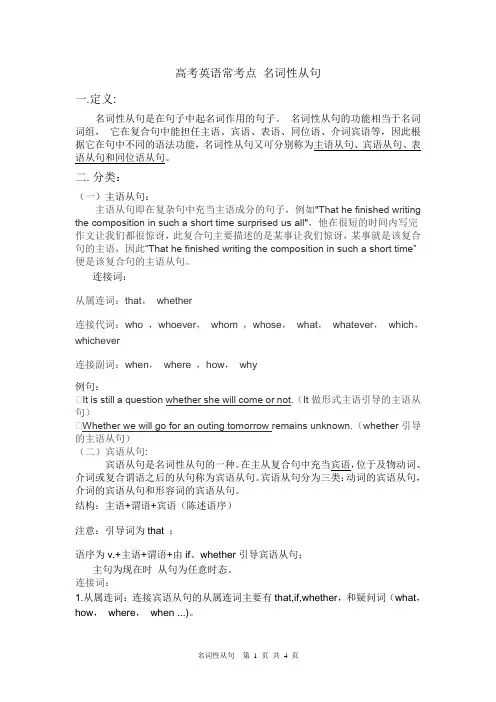
高考英语常考点名词性从句一.定义:名词性从句是在句子中起名词作用的句子。
名词性从句的功能相当于名词词组,它在复合句中能担任主语、宾语、表语、同位语、介词宾语等,因此根据它在句中不同的语法功能,名词性从句又可分别称为主语从句、宾语从句、表语从句和同位语从句。
二.分类:(一)主语从句:主语从句即在复杂句中充当主语成分的句子,例如"That he finished writing the composition in such a short time surprised us all",他在很短的时间内写完作文让我们都很惊讶,此复合句主要描述的是某事让我们惊讶,某事就是该复合句的主语,因此“That he finished writing the composition in such a short time”便是该复合句的主语从句。
连接词:从属连词:that,whether连接代词:who ,whoever,whom ,whose,what,whatever,which,whichever连接副词:when,where ,how,why例句:①It is still a question whether she will come or not.(It做形式主语引导的主语从句)②Whether we will go for an outing tomorrow remains unknown.(whether引导的主语从句)(二)宾语从句:宾语从句是名词性从句的一种。
在主从复合句中充当宾语,位于及物动词、介词或复合谓语之后的从句称为宾语从句。
宾语从句分为三类:动词的宾语从句,介词的宾语从句和形容词的宾语从句。
结构:主语+谓语+宾语(陈述语序)注意:引导词为that ;语序为v.+主语+谓语+由if、whether引导宾语从句;主句为现在时从句为任意时态。
连接词:1.从属连词:连接宾语从句的从属连词主要有that,if,whether,和疑问词(what,how,where,when ...)。
名词性从句在英语作文中英文回答,In English writing, a noun clause is a groupof words that acts as a noun in a sentence. It can be the subject, object, or complement of the main verb. For example, in the sentence "I know what you did", the noun clause "what you did" acts as the direct object of the verb "know". Noun clauses are commonly used to add complexityand depth to sentences, and they often begin with wordslike "that", "whether", "who", "whom", "what", "which", "why", "where", "when", or "how".中文回答,在英语写作中,名词性从句是一组词在句子中充当名词的作用。
它可以是主语、宾语或主谓补语。
例如,在句子“我知道你做了什么”中,名词性从句“你做了什么”充当动词“知道”的直接宾语。
名词性从句通常用来增加句子的复杂性和深度,它们通常以“that”、“whether”、“who”、“whom”、“what”、“which”、“why”、“where”、“when”或“how”等词开头。